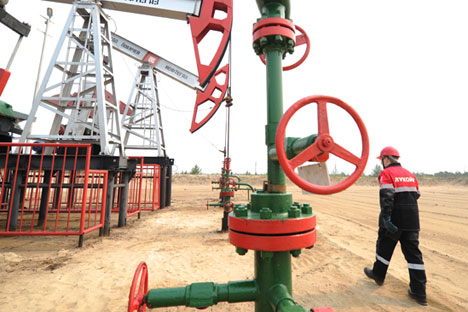Falling crude prices, not sanctions, hitting Russia’s GDP

Staff worker of Lukoil company at a pumping cluster in the Pokachi city area.
RIA Novosti/Ilya PitalevWestern sanctions imposed against Russia are responsible for just around 0.5 to 0.6-percent decline in the country’s GDP. Rapidly falling crude oil prices have been the real cause for the Russian GDP decline, reports the Kommersant business daily, citing an economic study carried out by Central Bank analysts.
Compiled by Andrei Sinyakov and Sergei Seleznev, and Agustin Roitman, an economist from the International Monetary Fund, the report talks of the dynamics of the Russian GDP model after western sanctions were imposed, in the third quarter of 2014, when oil prices fell from $110 to $50-55 per barrel.
The authors used a model based on the work of Arnold Harberger, a founder of the Chicago School, and Carlos Vegh, from the John Hopkins University. The authors have consciously factored in the extreme assumption that, in the course of the next five years, Russia will not have any access to capital in foreign markets, which will eliminate the country's foreign debt entirely by 2019.
Vladimir Bessonov, Director of Research of Inflation Problems and Economic Growth Study at the Higher School of Economics in Moscow, agrees with the conclusion.
"The precision of such evaluations is inevitably relative. However, in general, I confirm that Russia's GDP has fallen in relation to the change in energy prices, not the sanctions," he said.
According to official information, Russia's GDP in the January-June 2015 period fell by 3.4 percent in relation to the same period in 2014.
The U.S. and other Western nations imposed a series of economic sanctions against Russia after March 2014, to punish Moscow for its seizure of Crimea and its subsequent backing for militants in Ukraine’s eastern Donbass region. A conflict between the rebels and government forces in eastern Ukraine continues to simmer, despite a ceasefire agreement negotiated in February.
The sanctions imposed target a wide range of Russian companies and individuals seen as close to Russian President Vladimir Putin and, among other things, block state companies and banks from acquiring foreign credit.
Chronology the key
According to Bessonov, the proof can be found in the chronology of the fall of the Russian economy: The country’s GDP began to shrivel not a year ago when Western sanctions against Russia were introduced, but at the beginning of 2015, after the drastic fall in oil prices.
"The influence of sanctions on various sectors of Russian industry was mixed. Some sectors were able to establish the process of import substitution,” said Bessonov. “However, it is the key rate and the consequent cost of credit within the country that has had the main influence on the economy. The manufacturing industry is suffering especially from high borrowing costs."
The Central Bank was forced to raise the key rate, which determines the cost of all credit in the country, to 17 percent at the end of 2014 as the ruble went into freefall. Later it was reduced to 10.5 percent.
Bad news for the domestic market
According to Alexei Baskakov, director of the evaluation department at consulting network Finexpertiza, the current situation is to the advantage of exporters of energy resources who receive payments in foreign currencies, but for the majority of the sectors in the domestic market the rising cost of money has had a bad effect.
“We work with practically all sectors of the economy and today don't see any positive structural sectorial transformations, with the exception of, perhaps, import substitution projects, which receive aid from state banks,” said Baskakov.
Moreover, according to Georgy Vashchenko, director of operations on Russia's Capital Market at Freedom Finance, the fall in oil prices means that the development of Arctic shelf deposits is not profitable. This means there is no sense in increasing expenses for buying high-tech equipment – which in any case is also subject to sanctions.
"The main reason for the recession is the inflation brought about by the ruble's fall, which in turn is related to the drop in oil prices and the Central Bank's refusal to support the national currency," said Vashschenko.
All rights reserved by Rossiyskaya Gazeta.
Subscribe
to our newsletter!
Get the week's best stories straight to your inbox

